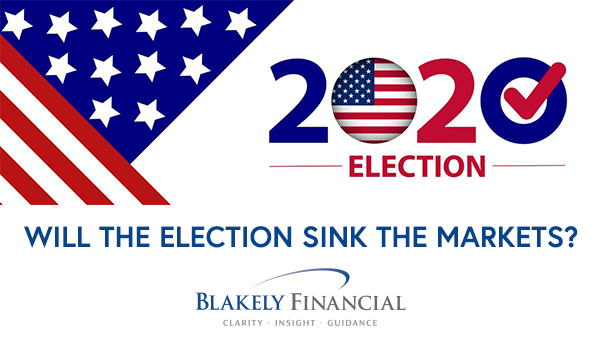Outlook 2021: Where We Are and Where We’re Headed
Presented by Robert Blakely, CFP®, AIF®, ChFC
As we approach the beginning of a new year and consider what it may bring, it is helpful to reflect on the one now behind us. After what has been a tumultuous year of unbelievable events and unprecedented circumstances, we have made it to a point where there may actually be more good news than bad. The election is behind us. Vaccines look to be more effective than anyone expected. Jobs and confidence are holding up surprisingly well as the economy adapts. Although the third wave continues to worsen, and many people will face a financial cliff at the end of the year as subsidies expire, more good than bad seems to be what markets are banking on.
In today’s environment, it’s hard to predict what might happen next, but we do know enough to make some educated guesses. The biggest call is simply this: that next year will be much better than this year.
What Things Look Like Today
On the medical front, there are signs the third wave is starting to peak. With many states now implementing mask requirements and shutdowns, we should bring the pandemic back under control in the next couple of months. And as the third wave recedes, we should see the first wave of vaccinations start. Given what we know today, we can have some confidence that the virus will start to move from an urgent problem to a chronic but manageable one sometime in the first half of the year.
From an economic standpoint, the news is even better. Right now, growth is still positive even as the third wave crests. Job growth continues to be substantially higher than what we saw before the pandemic, indicating our economy is healing and adapting. Consumer confidence is holding up, supported by the improving job climate. Retail spending has recovered to new highs and continues to grow. And as the medical news improves, we can expect to see both confidence and spending grow even faster.
With the consumer economy resilient and likely to improve with the medical news, business should also do well. Business confidence is already above the levels seen before the pandemic and in 2019. Business investment dropped off in early 2020, but it has been recovering and should move back to growth. With rising consumer demand, those trends may accelerate as well.
The last major component of the economy, government spending, is the wild card. The big question will be whether there is another stimulus package. Right now, prospects appear good. Where a stimulus package would help most is at lower levels of government. Both state and local governments have seen revenues fall, and since they cannot run deficits, they respond to revenue shortfalls by laying local government workers off. Help from the federal government would save those jobs and their purchasing power, and that could provide a substantial tailwind over the next quarter or so. Without such stimulus, the government could be a roadblock to total growth.
Another piece of the puzzle for 2021 is monetary policy. The Federal Reserve (Fed) has been extremely accommodating of the economy, keeping interest rates low, and that is likely to continue through 2021. With inflation still low, there will be little pressure for the Fed to raise rates anyway.
What This Means for 2021
Overall, the strength of the consumer and business sectors should help carry us forward, supported by the Fed’s low-interest-rate policy. Declines in government spending, if not countered by a federal stimulus, are the principal risk here. All things considered, though, we should see faster growth throughout 2021.
Markets have been cheering the vaccine news, as well as economic resilience. If things go as expected, markets still have room to appreciate further through 2021, although their path is unlikely to be as smooth. When the inevitable setbacks hit, we will see more volatility throughout the next year.
And that takes us to the risks and uncertainties. For the pandemic, the primary assumption is that the virus will be brought under control in 2021. This means that the vaccines must work, they must be widely available in the next six months, and enough people must be willing to take them. These are reasonable assumptions, but nothing is guaranteed.
For the economy, the primary assumption is that once enough people are vaccinated, the economy will return to something close to normal. Despite many changes—working from home, less travel, more online shopping—consumers and the economy are adapting. Although the new normal will not be exactly like the old, it will likely be normal enough. How fast we get there, though, is uncertain.
There are real risks here, but macro indicators are already suggesting we may be moving out of the recession. If those risks do materialize, we’ll likely see a somewhat slower recovery, but not a collapse. Even if things get worse, we’ll still be moving forward.
It Can Only Get Better from Here
From where we stand in late 2020, the prospects for 2021 remain positive. The healing process—for public health, the economy, and what will become our new normal—will not necessarily be smooth or without setbacks, but it will continue. This year did not go as we expected it to at the start, but our position now is much better than it could have been under the circumstances. We’re making progress, but it takes time. And that will be the story of 2021.
Disclosures: Certain sections of this commentary contain forward-looking statements that are based on our reasonable expectations, estimates, projections, and assumptions. Forward-looking statements are not guarantees of future performance and involve certain risks and uncertainties, which are difficult to predict. All indices are unmanaged and are not available for direct investment by the public. Past performance is not indicative of future results. Diversification does not assure a profit or protect against loss in declining markets. The S&P 500 is based on the average performance of the 500 industrial stocks monitored by Standard & Poor’s. Emerging market investments involve higher risks than investments from developed countries, as well as increased risks due to differences in accounting methods, foreign taxation, political instability, and currency fluctuation.
###
Blakely Financial, Inc. is located at 1022 Hutton Lane Suite 109, High Point, NC 27262 and can be reached at 336-885-2530.
Securities and Advisory Services offered through Commonwealth Financial Network, Member FINRA/SIPC, a Registered Investment Adviser. Fixed insurance products and services offered through CES Insurance Agency or Blakely Financial, Inc.
© 2020 Commonwealth Financial Network®









